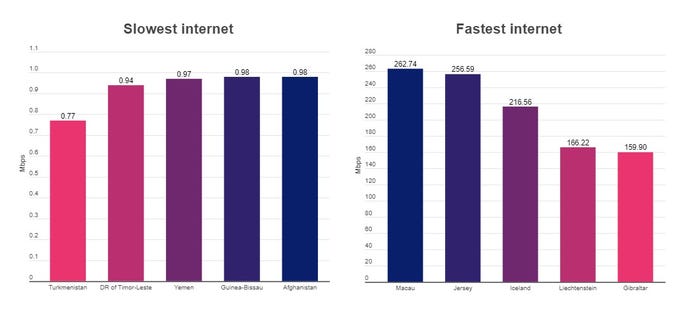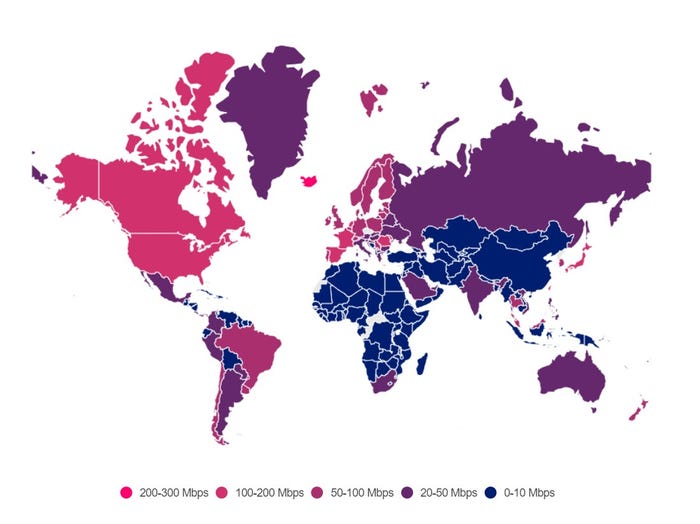Western Europe has the fastest broadband
New research from broadband price comparison service Cable.co.uk claims western Europe has the world's fastest broadband speeds overall, while the UK comes in at number 35.
September 6, 2022

New research from broadband price comparison service Cable.co.uk claims western Europe has the world’s fastest broadband speeds overall, while the UK comes in at number 35.
Cable.co.uk analysed over 1.1 billion broadband speed tests conducted across 220 countries to come up with its rankings, which identified that all of the 28 countries measured in Western Europe were in the top half of the table, with seven of them in the top ten, whilst the regional average speed of 99Mbps makes it the fastest region overall.
The UK came in 35th place with an average speed of 72.06Mbps, which puts it in the slowest half in the Western Europe region when it comes to average broadband speed, though we’re told it is an improvement on last year’s stats.
By way of demonstrating the difference, the report explains that downloading an HD movie of 5GB in size would take 2 minutes 36 seconds at the average speed in Macau which topped the league tables, while it would take a decidedly less swift 14 hours 46 minutes in Turkmenistan which came last.

“The fastest average speeds in the world are no longer accelerating away from the rest of the field, since FTTP/pure fibre saturation is hitting its current limits in many of the fastest locations,” said Dan Howdle, consumer telecoms analyst at Cable.co.uk. “Meanwhile, though the countries occupying the bottom end of the table still suffer from extremely poor speeds, the average speed of the bottom 10% is steadily improving, though don’t expect to be streaming HD movies in those countries anytime soon.
“Europe absolutely dominates the leaderboard once again thanks to largely excellent infrastructure. In all cases, those countries ranking highest are those with a strong focus on pure fibre (FTTP) networks, with those countries dawdling too much on FTTC and ADSL solutions slipping further down year-on-year. There is also a strong correlation between the size of the geographical area in question and the speed offered, with smaller countries/locations easier to service and upgrade and therefore often offering faster average speeds.”
The UK’s comparatively increased performance, whilst still trailing Europe, is presumably linked to numerous fibre rollouts happening across the country. This is of course a trend that’s true across western Europe as well, as there is a seemingly unending amount of investment money up for grabs to fund deployments. The German government announced in July it is targeting blanket fibre coverage by 2030 in an effort to drag Europe’s biggest economy up the FTTH league table.
There might be something close to 100 altnets in the UK providing fibre to various regions. As we pointed out in yesterday’s news that Giganet has purchased fellow UK fibreco Cuckoo, there are now questions as to just how many fibre players any one country can support long term. It’s entirely possible we start seeing some consolidation in the space soon, perhaps hastened by a slower than predicted consumer uptake due to the unforeseen cost of living crisis.

Get the latest news straight to your inbox. Register for the Telecoms.com newsletter here.
About the Author
You May Also Like





.png?width=300&auto=webp&quality=80&disable=upscale)




.png?width=300&auto=webp&quality=80&disable=upscale)


_1.jpg?width=300&auto=webp&quality=80&disable=upscale)